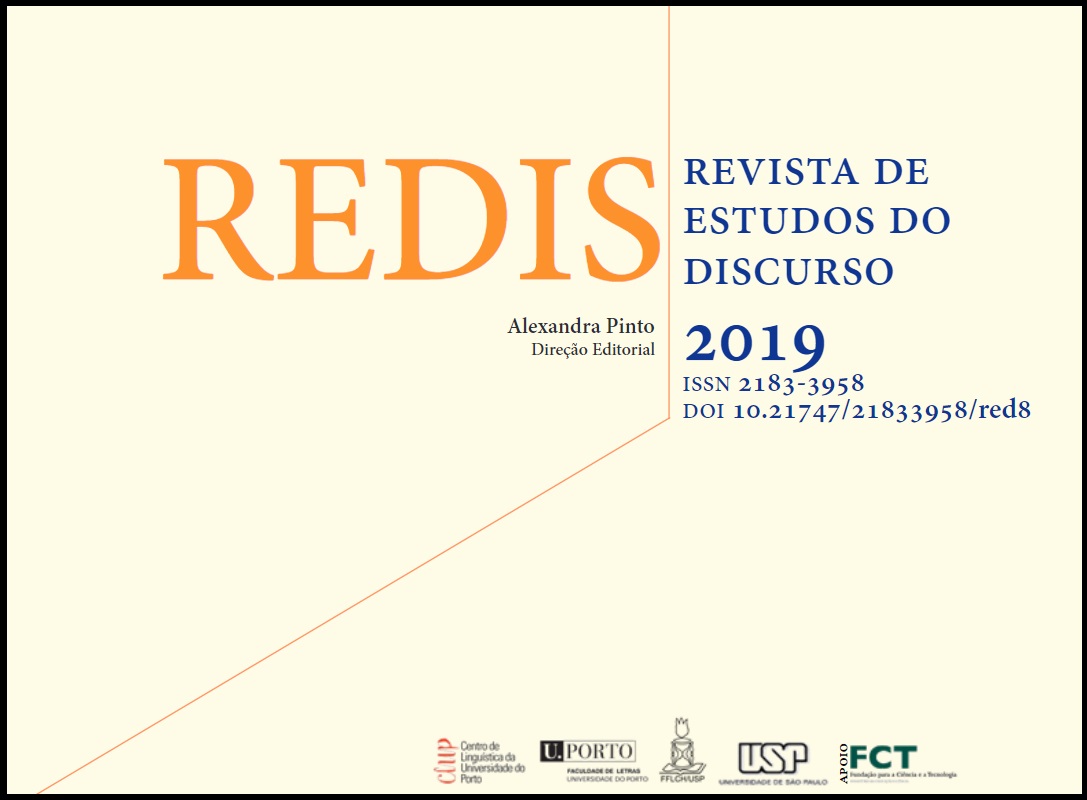Discurso(s) e polemicidade: algumas reflexões
DOI:
https://doi.org/10.21747/21833958/red8a3Palavras-chave:
Polémica, Pathos, Ethos, Argumentatividade, ArgumentaçãoResumo
O presente estudo retoma as noções complementares de “visée argumentative” e dimensão argumentativa, na senda de Amossy (2012 [2000]), ou, na ótica de Micheli (2012), as conceções estrita e alargada de “argumentação”, com vista à caracterização do discurso polémico.Tal reflexão passa necessariamente pela consideração das dimensões enunciativo-pragmática e configuracional dos discursos. Se bem que, numa perspetiva mais “clássica” a argumentação repouse no logos, é hoje indiscutível que ela passa pelo pathos e pelo ethos, jogando as emoções um papel central no jogo de influências que o locutor procura exercer junto do alocutário/destinatário e no desenho de um espaço antagónico.É nosso propósito, por um lado, analisar as marcas de “polemicidade” (retomando o conceito proposto por Amossy) presentes na materialidade discursiva, decorrentes da construção de um ponto de vista (a “éclairage” de Grize) apresentado ao locutor, a partir da análise de excertos de alocuções proferidas na Assembleia da República no contexto de consultas referendárias, referindo ainda a noção de “argumentatividade” proposta pela A. referida. Por outro lado, atribuir-se-á particular relevo às estratégias de dicotomização (Amossy, 2014) que subjazem à tensão entre posicionamentos éticos e ideológicos no espaço da polémica. Se bem que se entenda frequentemente que o texto argumentativo tem como finalidade persuadir/convencer, a análise dos excertos mencionados revela que a dicotomização por detrás da polémica conduz à impossível intercompreensão ou mesmo a um «diálogo de surdos», como refere Angenot (2008).
Referências
Amossy, R. (2000). L’ argumentation dans le discours. Paris: Nathan Université.
Amossy, R. (2014). Apologie de la polémique. Paris: P.U.F.
Amossy, R. (2018). Argumentation et Analyse du Discours, 20. Disponível em: http://aad.revues. org/2560. Acesso em 16/04/2018.
Angenot, M. (2008). Dialogues de sourds: traité de rhétorique antilogique. Paris: Mille et Une Nuits.
Doury, M. (2016). Argumentation. Analyser textes et discours. Paris: Armand Colin.
Fonseca, J. (1992a). Linguística e Texto / Discurso — Teoria, Descrição, Aplicação. Lisboa: ICALP.
Fonseca, J. (1992b). Os elementos de coesão do texto “Porque apoio Eanes”. In J. Fonseca, Linguística e Texto/Discurso. Teoria, Descrição, Aplicação, pp. 105-225. Lisboa: ICALP.
Fonseca, J. (1992c). Elogio do sucesso: a força da palavra/o poder do discurso, In Revista da Faculdade de Letras «Línguas e Literaturas», vol. IX. Porto: Faculdade de Letras da Universidade do Porto.
Fonseca, J. (Ed.). (1998). A Organização e o funcionamento dos discursos. Estudos sobre o Português. Tomos I, II, III. Porto: Porto Editora.
Fonseca, J. (2001). «Viva a Guiné-Bissau»: a construção do sentido e da força persuasiva do discurso.
CLAC: Círculo de Linguística Aplicada a la Comunicacción. Revista electrónica, 6.
Kerbrat-Orecchioni, C. (2016). Le désaccord, réaction «non préférée» ? Le cas des débats prési-dentiels. Cahiers de Praxématique, 67. Disponível em: http://journals.openedition.org /praxematique/4524. Acesso em 15/09/2017.
Menéndez, F. (2005). Estruturas do discurso polémico em português. In M.A. Marques et al. (org.), Ciências da Linguagem: 30 anos de investigação e ensino. 1.a ed. Braga: Universidade do Minho/ILCH, pp. 171-182.
Micheli, R. (2012). Les visées de l’argumentation et leurs corrélats langagiers: une visée discursi-ve. Argumentation et Analyse du Discours, 9. Disponível em: http://aad.revues.org/1406. Acesso em 15/10/2012.
Rabatel, A. (2018). Pour une reconception de l’argumentation à la lumière de la dimension argu-mentative des discours. Argumentation et Analyse du Discours, 20. Disponível em: http://aad.revues.org/2493. Acesso em 16/04/2018.
Ramos, R. (1998). «Os doze abutres»: estrutura e funcionamento de um texto polémico. In J. Fonseca, (Ed.). A Organização e o funcionamento dos discursos. Estudos sobre o Português. Tomo III, pp.109-156. Porto: Porto Editora.
Rodrigues, S. M. (2011). Estrutura e funcionamento da interacção verbal polémica. Contributo para o estudo da polemicidade em Camilo Castelo Branco. Lisboa: Fundação Calouste Gulbenkian / Fundação para a Ciência e a Tecnologia.
Downloads
Publicado
Como Citar
Edição
Secção
Licença
Direitos de Autor (c) 2020 Redis: Revista de Estudos do discurso

Este trabalho encontra-se publicado com a Licença Internacional Creative Commons Atribuição 4.0.
Os autores cedem à REDIS: Revista de Estudos do Discurso, o direito exclusivo de publicação dos seus textos, sob qualquer meio, incluindo a sua reprodução e venda em suporte papel ou digital, bem como a sua disponibilização em regime de livre acesso em bases de dados.




